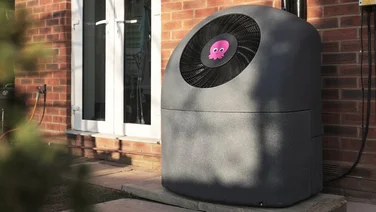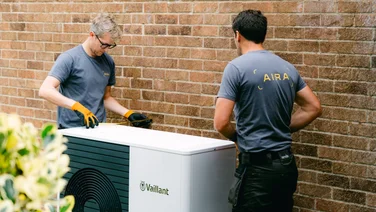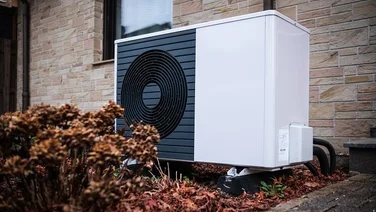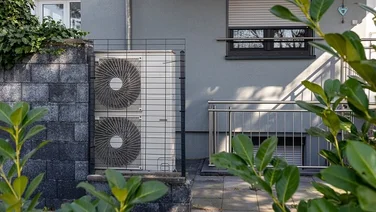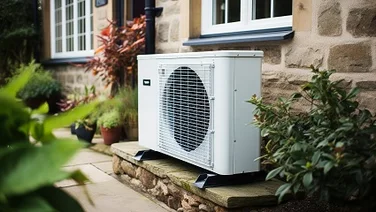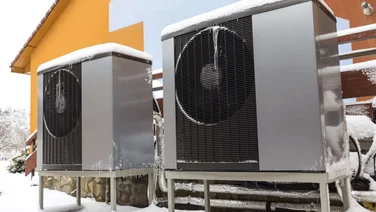We receive a small fee from trusted installers when you request a quote through our site. This helps us keep our content independent, well-researched and up to date – Learn more
- Air source heat pumps reach efficiency ratings of 300%
- A commercial air source heat pump will cost between £6,000–£18,000
- Commercial heat pumps can save businesses around £3,000 per year
Air source heat pumps are one the best alternatives to traditional gas boilers – and with the government’s Boiler Upgrade Scheme knocking £7,500 off the price of heat pumps, there’s never been a better time for households to invest.
But what are their commercial applications? And do they have a distinct advantage over ordinary boilers?
We’re diving into everything you need to know about commercial air source heat pumps, from their cost to their suitability for businesses, through to what alternatives there are and whether your building is suitable for one.
If you want to see how much you could save by getting a heat pump, pop a few details in this quick form to receive free quotes tailored to you and your company’s needs.
What type of central heating do you currently use?
Get started
What is a commercial air source heat pump?
First, a general look at what an air source heat pump is. An air source heat pump is a sustainable way of heating a building, without relying on fossil fuels. It does this by extracting the warmth from the ambient air outside, using this heat to warm radiators and provide hot water.
An air source heat pump is able to warm buildings by funnelling the warm air extracted from the outside through a compressor (also known as a heat exchanger), which raises the temperature. This makes it so heating a home with an air source heat pump feels much the same as it would with an ordinary boiler.
They look a lot like a typical air-conditioning unit and the amount of heat they can generate depends on the size of the unit. For most residential buildings in the UK, a single unit is more than sufficient to provide heating throughout the year. For commercial buildings however, you’ll typically need more than one unit, or a larger, more powerful one.
Despite gradually growing in popularity, only 51% of people are aware of heat pumps, according to our National Home Energy Survey.
Here’s a diagram showing how an air source heat pump works:

Heat pumps aren’t strictly used for heating, as they can work as an air conditioner in warmer weather. Buying an air source heat pump for your business then, means getting two products in one!
How much does a commercial air source heat pump cost?
Smart businesses are always looking for ways to reduce their operating costs, something that a reliance on fossil-fuel powered heating systems has always made difficult. Not only difficult, but unpredictable too, because you never know when there might be a shortage of fuel. We’ve already seen the effects of this on energy suppliers across the country.
This makes commercial air source heat pumps an attractive prospect, because really the only things you’ll personally be paying for are the unit, the installation costs, and the electricity needed to power it.
Of course, it’s important to remember that a good deal of the UK’s electricity is still generated by fossil fuels, though renewable energy’s contribution to the National Grid is improving.
Obviously, these costs still need to be considered before making a decision, but we’re going to show you how much commercial air source heat pumps cost, and most importantly, how they can save you money.
Running costs of a commercial air source heat pump
Air source heat pumps are far more efficient than ordinary gas-powered boilers. They don’t use any fossil fuels and only need electricity to keep them going. Plus, this high efficiency can see air source heat pumps reach efficiency ratings of 300%. This means you’ll be generating three units of energy for every one unit of electricity the heat pump takes in.
Compare this to even the most efficient boilers, which can only reach an absolute max efficiency rating of 98%. Right now though, electricity is roughly four times more expensive than gas, so the actual running costs of an air source heat pump versus a gas-powered boiler is similar.
This is expected to change over the years though, as the UK sees more of its electricity generated from renewable sources (such as solar power). With this in mind then, you can confidently say that air source heat pumps will reach far lower operating costs than gas-powered boilers, which themselves are susceptible to the uncertainty of gas prices.
If you’re wondering exactly how an air source heat pump is so efficient, it’s because it doesn’t create heat, it simply transfers it. This gives it the ability to be more than 100% efficient.
Maintenance costs for air source heat pumps are very low too, thanks to the fact that they last substantially longer than ordinary boilers. Depending on the power of the heat pump, you’ll be looking at between £135-300 (plus VAT) for a full service.
Typical cost of a commercial air source heat pump unit
Depending on the size of your building, and how large a unit or how many you need, you should expect to pay between £6,000 and £18,000 (including installation) for a commercial air source heat pump.
Naturally, this can scale beyond £18,000 if you need to stack multiple units.
How much can you save?
By no longer needing to purchase fuel, a commercial air source heat pump will help businesses save money that would be otherwise spent on fuel bills. In fact, a study done by the Energy Saving Trust revealed that commercial heat pumps can save businesses around £3,000 per year, if not more for larger installations.
Another study of heat pumps showed that the overall savings on fuel costs from air source heat pumps can be as much as 51% per year. And with new models boasting even greater efficiency, it’s likely that these savings will get even higher.
Be aware though, that a poorly insulated building will not see a heat pump reach its true potential. In fact, if your building is not properly insulated, a heat pump can actually end up costing you more than a boiler, so bear this in mind.
What type of central heating do you currently use?
Get startedWant to get a better idea of what it’s like to own an air source heat pump? Check out our case study with Louise, from South London.
Louise had a 12-kilowatt air source heat pump installed to reduce her reliance on fossil fuels, and received £5,000 off the upfront cost through the Boiler Upgrade Scheme. Now, Louise can enjoy a warm, even temperature throughout the house, without fluctuations.
Take a look at the full interview with Louise to learn more.
How popular are commercial air source heat pumps in the UK?
Putting an exact number on the number of businesses currently using air source heat pumps is difficult. What we can do, however, is tell you how many are expected to be built over the next few years.
The International Energy Agency reports that the UK is expecting to deploy 600,000 heat pumps every year until 2028. To be clear, that doesn’t necessarily mean they’ll stop deploying after 2028!
This ambitious target will require a significant push from the UK government, especially considering that their Renewable Heat Incentive (RHI) scheme is now coming to an end in March 2022.
Is your building suitable for a commercial air source heat pump?
Whether your building will be suitable for a commercial air source heat pump depends on a number of factors. Namely:
- How old the property is (an old building is less efficient for a heat pump, but there are still times when a heat pump can be used)
- What existing heating system you have in place (some buildings can use existing pipework previously used by boilers)
- How well insulated the property is
Another thing you’ll need to consider is your existing radiators. This is because air source heat pumps run at a slightly lower temperature of 50-55°C (122-131°F), compared to 65-80°C (149-176°F) for boilers. Subsequently, you’ll need bigger radiators to make air source heat pumps worth it.
What are the alternatives?
Air source heat pumps aren’t the only sustainable heating solutions out there. One such solution is a ground source heat pump, which is a similar concept to air source heat pumps, only this time the warmth comes from the ground.
Like an air source heat pump, a ground source heat pump extracts ambient warmth and runs it through a compressor. It does this by running a series of pipes filled with water (and often antifreeze) underground. These pipes are warmed by the ambient heat of the soil. There are typically two types of ground source heat pumps – vertical and horizontal.
A vertical ground source heat pump requires a borehole to be drilled, with the pipes running vertically down to the bottom. A horizontal installation is where the piping is laid a metre or so underground across a wider area.
Generally speaking, vertical installations are more expensive because of the specialist machinery needed to drill the borehole. Horizontal installations, whilst cheaper, do require more land.

Commercial air source heat pumps in action
Businesses across the UK are already taking advantage of the benefits of air source heat pumps. And the best part? There’s proof out there that even older buildings can make use of heat pumps, when done right.
Check out what JM Renewable Solutions managed to install for this rustic B&B in Wales. The fact that the B&B was able to reduce their energy bills by 50% is impressive, especially considering that older buildings are often far less efficient and thus more expensive to heat.
Another great example of commercial heat pump application is this installation on a block of flats by Valliant. Whilst not a business per se, it’s always encouraging to see sustainable ways of heating homes on a larger scale.
Next steps
As heat pumps increase in popularity, we expect to see more businesses adopt the technology to not only reduce their bills, but cut their carbon emissions.
After all, reducing our carbon footprint is the most important thing in our fight against climate change right now. Having lower or zero emissions is great for business’ image too!
It’s clear already that this technology can knock boilers off of the throne, we just hope to see the UK government do more to help businesses make the switch.
Unfortunately, the Renewable Heat Incentive (RHI) is set to end in March 2022, with applications no longer being accepted.
Heat pumps are still a great option, though. If you want to see how much you could save your business by using heat pumps, just pop a few details into our easy-to-use comparison tool.
Our suppliers will send you free quotes for you to compare, and you’ll be reaping the rewards in no time.

